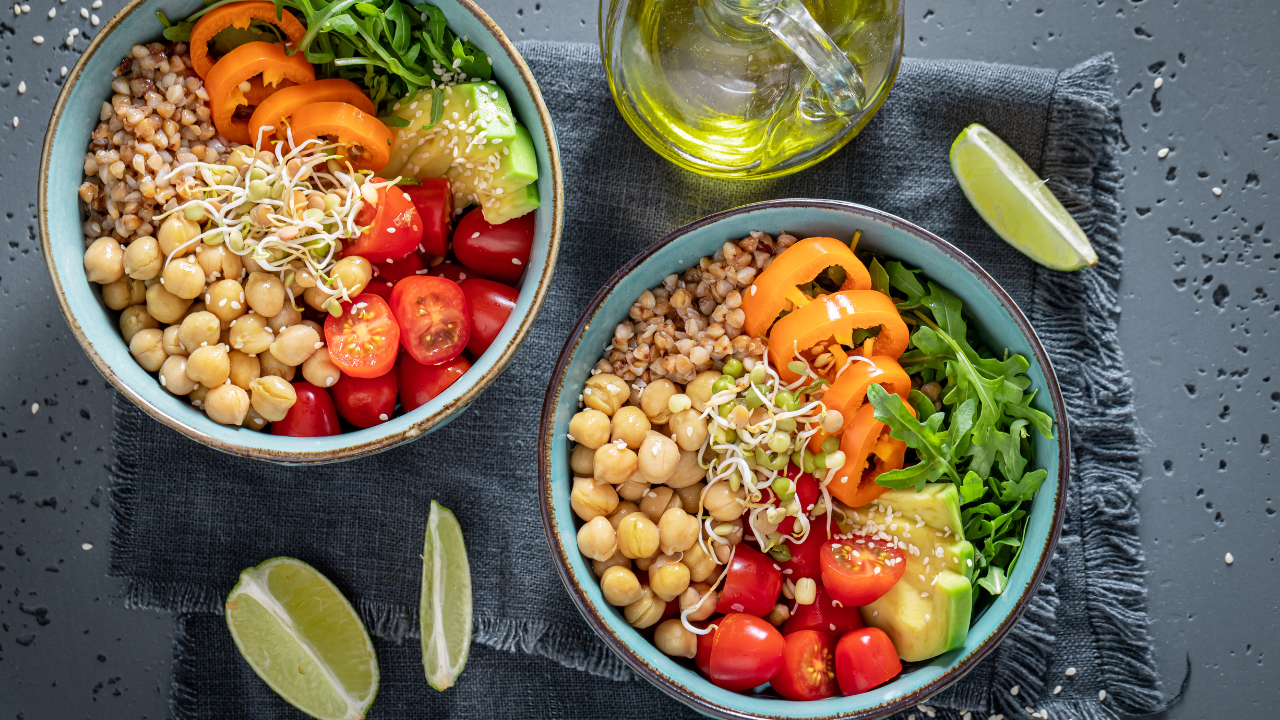7 Reasons Why You Are Overeating and What to Do When You Eat Past Fullness
Do you ever feel like whenever you eat, you just can’t seem to stop at a comfortable fullness? There could be quite a few reasons why this happens.
If you’re new here, hello and welcome! My name is Hannah and I am a non-diet dietitian here to help you improve your relationship with your food and finally find food freedom.
A few disclaimers before we begin - first, I don’t really love to use the term “overeating” because it insinuates that there is a “right” or “wrong” amount of food that you should eat. This is not the case! The “right” amount of food for you will vary from day to day, even meal to meal. And it largely varies from person to person.
You may see me use the term “overeat” within this post for Google search purposes (just blogger things), however I often like to use the phrase “eat past fullness” instead, as this doesn’t seem to have as much shame attached to it.
And this leads me into the second disclaimer - eating past fullness or overeating is not a character flaw or moral failing! It is okay and totally normal to eat past fullness from time to time. For example, if I am trying a new restaurant or traveling somewhere new, I’m likely to eat more than usual. I trust that my body can handle some extra food.
Now, it would not feel good to eat past fullness at every meal on a routine basis. So while it is normal to eat beyond a comfortable fullness from time to time, I want to shed some light on why this may be happening. You and your body are on the same team! Rather than shaming yourself for eating “too much”, try to get curious about what led up to it.
Table to contents
Reasons why you eat past fullness
There are a few possible reasons why you are routinely eating past fullness.
@dietitianhannah Replying to @pretentiouspear intentionally skipping meals always backfires #dietitianhannah #dietitiansoftiktok #dietitiantips #dietitianapproved #nondietdietitian #antidietdietitian #weightneutral #intuitiveeating #foodfreedom #dietculture #skippingmeals #nutritiontips #antidietculture #nondietapproach ♬ original sound - Dietitian Hannah
You are not eating enough
Whether unintentional or intentional (i.e. via dieting), not eating enough is one of the main causes of overeating. This has nothing to do with willpower or motivation. Your body is just trying to meet its needs!
Think about it this way - if you are underwater and need to hold your breath for a long time, what happens when you finally come up for air? You likely will be taking deep breaths as your body tries to regulate. The same thing happens with food. If we don’t eat enough, our body may try to eat more the next time that it gets a chance.
You are going too long between meals
Similarly, going too long without a meal or snack can also trigger eating past a comfortable fullness. See analogy above.
Every person is different when it comes to the “best” meal timing for them. On average, most can benefit from having a meal or snack every 3-4 hours or so. This is not a rule, just a guideline. It’s okay if you want to eat prior to the 3 hour mark.
You are mentally restricting
You might be thinking “I am eating enough and not skipping meals, but I still can’t seem to stop when I feel full!” This could be a result of something known as mental food restriction. Here are a few examples of what mental restriction looks like:
“I can eat this, but only if I do an extra long workout to burn this off.”
“It’s okay to eat this food in moderation, but every day would be too much.”
“If I’m eating *enter forbidden food* right now, I should not eat it again later.”
Similar to physical food restriction, mental restriction also triggers the restrict-binge cycle. Restriction of either type tells our body that it will not be getting what it needs, and the body will naturally respond by increasing cravings, appetite, and instances of binge-type eating.
You are a member of the “Clean Plate Club”
If you were raised to clean your plate, this may have taught you to disregard your body’s appetite cues. You are no longer hungry? Too bad, you must finish your plate before getting up from the table!
It is okay to stop eating when you feel satisfied, even if there is food left on your plate.
Your meals are not balanced
If your meals are lacking certain nutrients, they may not be keeping you satisfied. I recommend including protein, fats, and fiber at each meal and snack. These nutrients help us to stay full between meals. Repeat this every few hours, and hopefully this will prevent you from getting super hungry.
This is something that I call The Blueprint for Balanced Meals and I teach all about it inside The Nutrition Reboot Membership.
You are emotionally eating
Most of us have eaten in response to an emotion rather than physical hunger cues at some point. Stress, anxiety, loneliness, boredom, anger (all common triggers for emotional eating) are feelings we all experience throughout life. Just part of being a human!
Food can 100% be an effective coping strategy. However, it cannot be the only tool in our toolbox. Check out this post for my emotional eating tips.
You are food insecure
If you experienced food insecurity at any point during your life, this may have trained your body to eat extra when food is available. Even if you are no longer food insecure, you body may still be reacting to the past experience.
Related post: Is Sugar Addiction Real?
What happens to your body when you eat past fullness
Your body is super smart and capable and it can handle you eating past the “perfect” level of fullness (which doesn’t exist, btw). There are a few different ways your body may respond to you eating past fullness.
Your body may hold off hunger
If you ate a little extra at your last meal or snack, your body may wait a little longer than usual to send you hunger cues.
Your body naturally satiates sooner at the next meal or snack
After eating a larger-than-usual meal or snack, you may find that you feel fuller faster the next time you eat.
Your metabolism may acutely increase
Your metabolism may speed up after overeating to burn off the extra calories. This may explain why you feel a bit hot, sweaty, dizzy after eating past fullness.
How to identify fullness cues
You may be wondering, “okay, but what does fullness even feel like? What signs are we looking for to know when it might be a good time to stop eating?” There are various fullness cues to look out for.
No longer paying as much attention to your food.
Losing interest in the meal.
The food no longer tastes as good.
Usually the first few bites taste the best as a way for your body to drive you to keep eating. But as you get energy, the intense taste wanes.
Physical fullness or distention in your stomach.
Feelings of boosted energy, and/or a relaxed and pleasant mood.
Feeling your fullness is a principle of the Intuitive Eating framework. I talk more about it in this post here.
What to do when you eat past fullness
Be kind to yourself
It is important to cope with kindness after overeating. Be gentle with yourself. I know, this is easier said than done. But beating yourself up is only going to make it more difficult to break the restrict-binge cycle.
Get curious about the situation
What happened leading up to you eating past fullness? Do you notice any patterns from previous overeating episodes? Try not to be judgmental here and instead reflect and investigate in order to learn about your overeating triggers.
Stay off the scale
Avoid weighing yourself. I discuss many reasons why I don’t recommend weighing yourself here, but staying off the scale is especially important if you want to break the restrict-binge cycle.
After overeating, it would make total sense that your weight would be temporarily increased due to eating food. It’s not a bad thing that the number went up! It will balance out over time. Even if your rational brain understands this concept, seeing the number after a eating past fullness when you may not be mentally at your best could be a trigger for restriction. Why go looking for information that isn’t helpful?
Resume consistent eating habits
You may feel the urge to restrict after eating past fullness. However, this will likely just put you back in the same situation. Try to eat every few hours, even after overeating. Include protein, fats, and fiber at meals and snacks so that they are satisfying.
Bottom line
It is totally normal to overeat from time to time. We are humans, not robots! If you find that you are routinely eating past fullness, there is likely a reason. Be sure that you are eating enough, eating consistently, and meeting your emotional needs.
Remember that you and your body are on the same team! Try to assess the causes of overeating with curiosity rather than judgement.
If you are looking for more support in this area, we’d love to guide you inside The Nutrition Reboot Membership, my signature diet-ditching program.
Did you find this post helpful? Let me know your thoughts in the comments below!
Learn more
Featured podcast episodes
Featured video
Want more help on your diet ditching journey?
Join my signature membership to become part of a community of ex-dieters working towards food freedom and making peace with food so they no longer need to cut out their favorite foods.
More on the blog
Disclaimer: this post is for informational and educational purposes only and is not a substitute for professional medical advice.
































